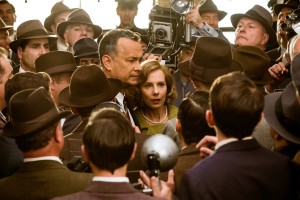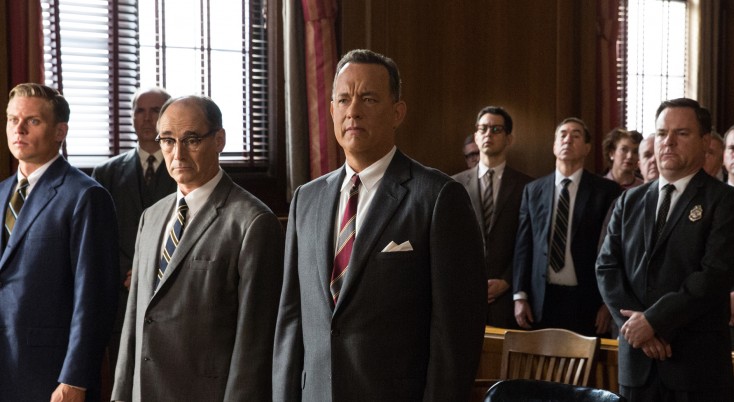
BRIDGE OF SPIES Tom James Donovan (Tom Hanks) and his wife Mary (Amy Ryan) become the target of anti-communist fears when Donovan agrees to defend a Soviet agent arrested in the U.S. in BRIDGE OF SPIES. ©Dreamworks. CR: Jaap Buitendijk.
By ANGELA DAWSON
Front Row Features
NEW YORK—Tom Hanks reunites with Steven Spielberg for their fourth film, “Bridge of Spies,” a political thriller set during the Cold War.
Hanks plays insurance attorney James B. Donovan, who is instrumental in securing the exchange of American military pilot Francis Gary Powers, who was shot down in his U2 aircraft over Soviet airspace in 1960, for captured KGB agent Rudolf Abel, whom he represents in court.
The two time Academy Award winning actor (“Philadelphia,” “Forest Gump”) previously starred in Spielberg’s “Saving Private Ryan,” “Catch Me if You Can” and “The Terminal.” They also collaborated on the award-winning World War II TV miniseries “Band of Brothers” and “The Pacific.” “Bridge of Spies” also reunites him with Joel and Ethan Coen (“The Ladykillers”), who co-wrote the screenplay with Matt Charman. As Donavan, Hanks uses legal acumen rather than brawn to resolve a conflict.
The always jovial Hanks spoke about telling this little known chapter of American history and why he wanted to do it.
Q: Playing this unsung hero of the Cold War, do you see him as part of maybe a bookend or another chapter in men you’ve played before who are similarly heroic?
Hanks: I don’t view this as a bookend to anything because every movie starts fresh and has to exist on its own auspices. The interesting thing that happens when you play someone real is you have to have meetings with them if they’re alive, and you have to say, “Look I’m going to say things you never said and do things you never did and I’m going to be places you never were. Despite this, how can we do things as authentically as possible?”
Much like the boss (Spielberg), I was fueled by absolutely no preconceived knowledge of James Donovan. I knew nothing about the man, so when you’re coming across this guy who is an awfully good insurance lawyer, who ends up becoming a part of such a momentous six days in history, (it’s welcomed). I’m a selfish actor and I’ll lunge at that opportunity regardless of anything else I’ve done prior.
Q: What was the heart of this character for you?
Hanks: He wrote an awful lot about his own life. He wrote a book about his experience with Rudolf Abel that goes so in depth into the trial, so I felt like I was court stenographer. It just goes on and on, this motion and that motion, but I ended up not reading the book. You look for some degree of superstructure of who it is—outside of the fact that he’s got a smoking hot wife. You look for something in the past, that he was a prosecutor of the Nuremberg war crimes. That means that he wasn’t the type of soldier that went and tried to kill as many Nazis as possible. He wanted to nail as many Nazis as possible (in the courtroom). That’s a different kind of man. You take that into account when it pays off in the screenplay. For example, I thought at one point, his arguments to the Supreme Court, “Oh come on, let’s not guild the lily here, Let’s not turn it into a more operatic moment than necessary.” But it turns out that’s exactly what he said to the Supreme Court. It’s a factor that emboldens itself to the process of making the movie. And it’s never wrong with playing a guy who’s got a smoking hot wife.
Q: The film represents an American ideal in Donovan that is sort of lost. It has a distinct Coen brothers flair. I wanted to know how their style affected your direction and acting?
Hanks: This is the second time I’d been in anything the Coens had done. Their dialogue scans. It ends up devolving into an almost percussive give and take that’s different from other motion picture dialogue in which it’s mostly text as opposed to subtext. That first scene—which is essentially an insurance negotiation—is them to a tee. I don’t want to put too many roses on what they do, but there is a cadence that is individual to each character. In a lot of screenplays, one very specific thing is happening in the scene and both characters sound the same after awhile, but that just never happens in this. It always seems with the Coen brothers like someone is rocking back on their heels while another person is making arguments you can’t even begin to imagine.
Q: Did you think of or did you consult with people who defend the prisoners of Guantanamo Bay?
Hanks: It ends up getting quite fascinating. Immediately after I read the screenplay, I did what everybody does, and I Googled James Donovan. There wasn’t an awful lot, but I came across a piece on YouTube in which the real Donovan was interviewed at the courthouse and he stated the reason why he took the case and carried it to the extremes of the Supreme Court. He said, “You can’t accuse this man of treason. He’s not a traitor. He’s a patriot to his cause. Only an American can be a traitor and commit treason against their own country. He’s just a man doing his own job in the same way we have men doing their own jobs here. As soon as you start torturing the people we have, then you give the other side permission and cause to do the same exact thing. That’s not what America stands for, at least not what America stood for when I was studying ethics in school. As soon as you start executing (political prisoners), you are not far removed from the KGB. This is what Donovan took from the get go and you can’t deny it.





